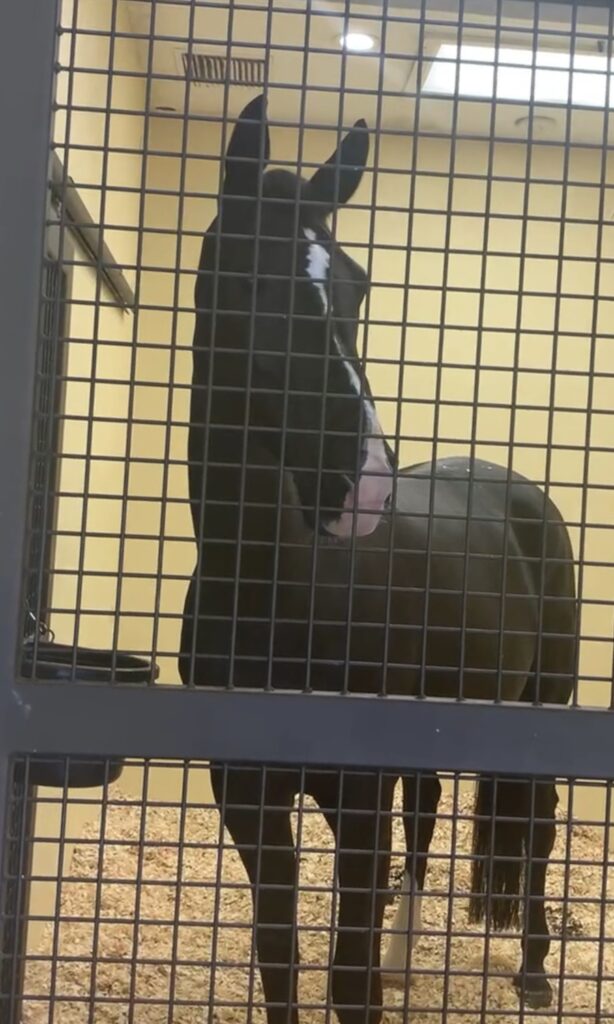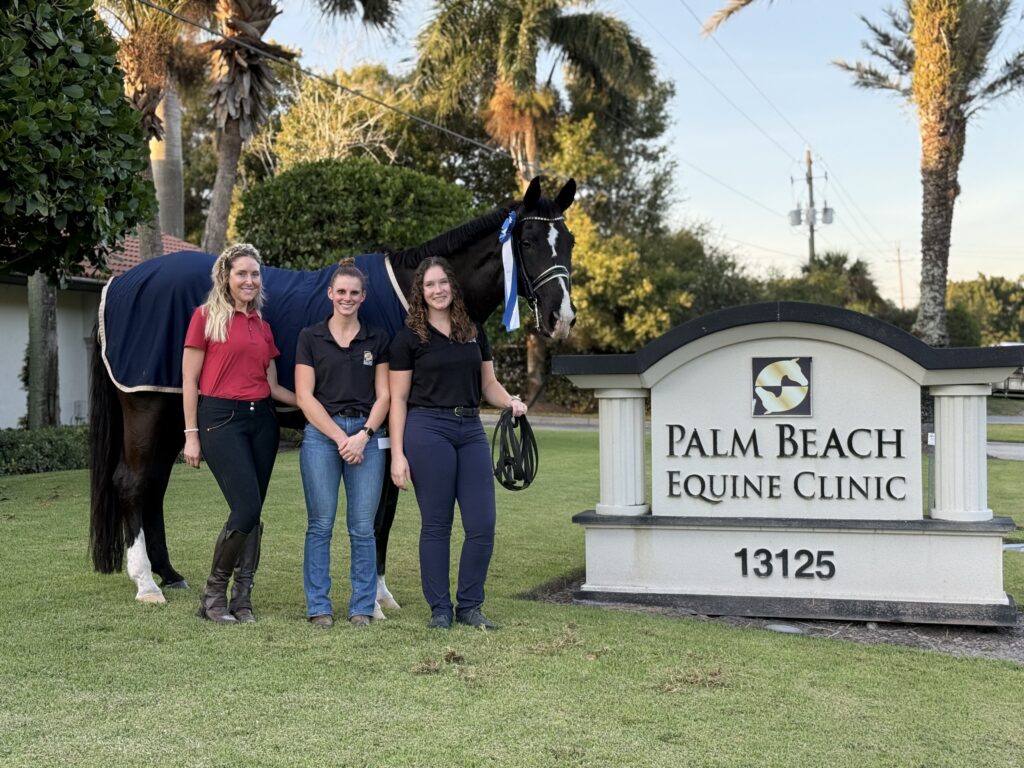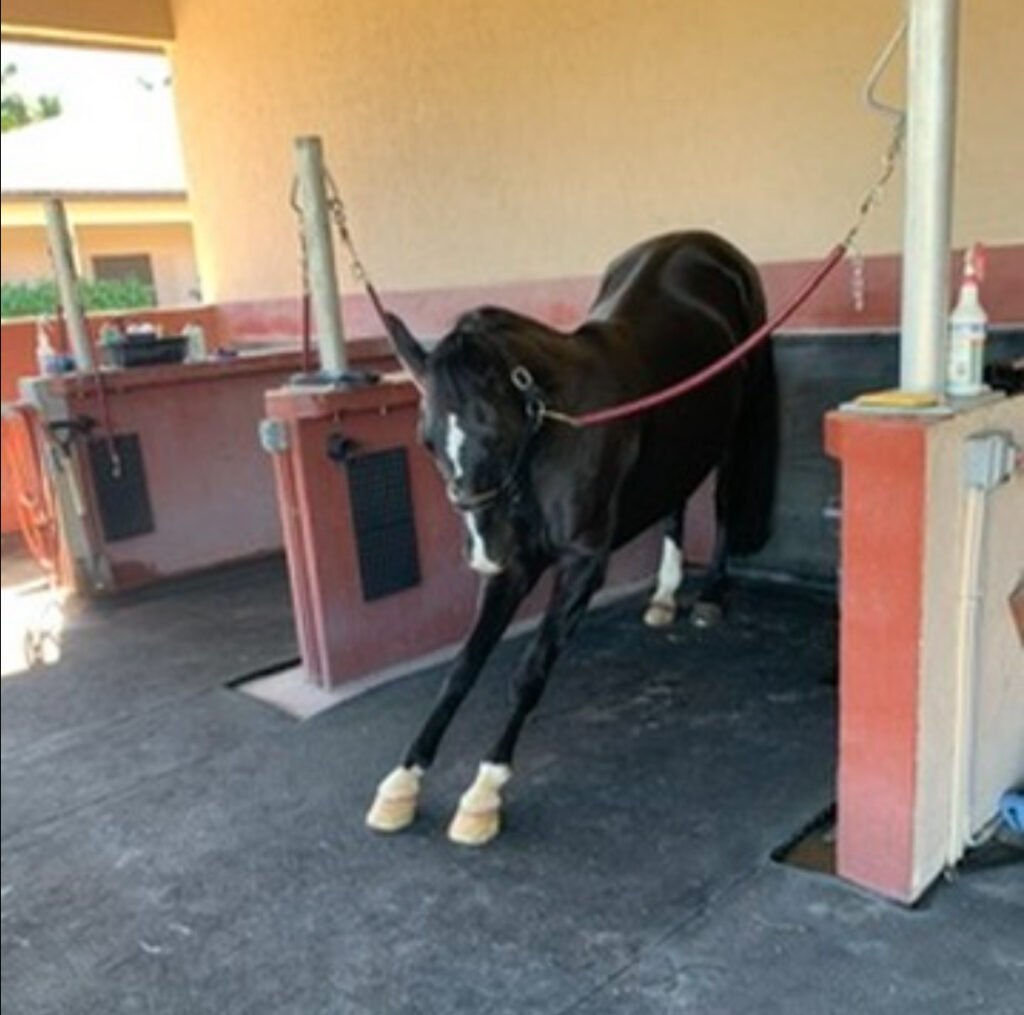
Photo courtesy of Jennifer Chaszar
When 17-year-old Oldenburg gelding Madison Avenue (by Madison x Olympic Ferro), known as “G6” in the barn, developed recurring fevers and concerning bloodwork in September 2025, his owner, Jennifer Chaszar, knew something wasn’t right. His primary veterinarian, Dr. John Lockamy, had been monitoring him closely at home at Lady Jean Ranch in Jupiter, FL, but as his inflammation markers climbed and his fever returned, Dr. Lockamy recommended a deeper look.
“G6 had developed a fever that returned after initial treatment, he had a low white blood cell count, and his serum amyloid A (SAA) level was elevated at 3,000 in his bloodwork,” Chaszar recalled. “Dr. Lockamy referred us to Palm Beach Equine Clinic (PBEC) because we didn’t want to overlook a more serious underlying issue.”
SAA is the major acute phase protein in horses and is produced during the acute phase response, which is a nonspecific systemic reaction to any type of tissue injury. While usually very low or close to zero, that number will rapidly and dramatically increase with a systemic infection.
A Critical Revisit
G6 was initially treated at PBEC in Wellington, FL, in 2023 when he had recurring colic symptoms. What was initially thought to be ulcers was diagnosed through gastroscopy as delayed gastric emptying by Dr. Jordan Lewis. A change in diet, with an emphasis on the portion size at each feeding, helped increase motility in his digestive tract and eliminate symptoms for a time, but those returned two years later.
G6 arrived at PBEC on September 21, 2025, where he was evaluated by internal medicine specialist Dr. Emilee Lacey and intern veterinarian Dr. Rachael Davis. G6 had been experiencing intermittent fevers, lethargy, and colic signs. An abdominal ultrasound soon revealed a left dorsal displacement of his large colon, which thankfully resolved with supportive care.
However, his bloodwork told a more complicated story. With inflammation still present, the PBEC team performed a gastroscopy to visualize the stomach lining. “The gastroscopy showed a few ulcerations of the squamous mucosa of the stomach and a nodular mass in the pyloric region,” said Dr. Davis. “The duodenum (first part of the small intestine) was mottled in appearance. Biopsy samples from both the pyloric mass and the duodenum were collected and submitted for histopathological analysis, which revealed evidence of inflammatory bowel disease.”
Chaszar remembered the relief she felt when the biopsy results returned. “The biopsies came back negative for malignancy,” she reported. “There was no evidence of cancer — just inflammatory changes. That provided tremendous relief and allowed us to focus on healing and recovery.”
G6 remained bright, cooperative, and comfortable during his stay, a testament to the attentive nursing and veterinary care he received.
Healing at Home
Dr. Lacey prescribed a thoughtful treatment plan that included gastroprotectants, dietary changes, and careful monitoring at home.
“Due to his known diagnosis of delayed gastric emptying and the suspicion of inflammatory bowel disease (IBD), we recommended trialing a diet that excluded wheat and his known allergies of corn, oats, rice bran, and carrots,” explained Dr. Lacey. “IBD has been loosely associated with gluten intolerance (wheat) in horses.”
Back home, Chaszar followed PBEC’s instructions closely to help support G6’s recovery. “His diet was modified to include softer, easily digestible forage and smaller, more frequent meals,” she noted. “I monitored his temperature, appetite, and demeanor every day to be sure he was progressing.”
Dr. Lacey and Dr. Davis also stressed the importance of daily exercise to promote normal gastrointestinal motility, hydration, and close communication with the veterinary team. They also wanted to see G6 back in 30 days for an examination.

Photo courtesy of Jennifer Chaszar
A Promising Recheck
Exactly one month later, G6 returned to PBEC for a scheduled recheck gastroscopy. Chaszar described this visit as a hopeful milestone. “His second visit was a one-day appointment designed to see how the pyloric nodule and inflammation had responded to treatment,” she said.
The news could not have been better. Dr. Lacey reported that the previously seen ulceration had completely resolved, and the pyloric nodule had reduced by about 75%, indicating that the treatment plan was working.
With that progress confirmed, G6 discontinued the gastroprotectants and continued with supportive nutrition and management. “It was wonderful to see that improvement,” said Chaszar. “His appetite has returned to normal, and his energy is strong. G6 is back to acting like a four-year-old! When I lead him to the arena, he nickers under his breath and then shows me the Spanish walk and downward dog tricks that he does before we move on to the serious part of work.”
A Testament to Exceptional Care
Chaszar credits PBEC’s team not only for their medical expertise but also for the warmth and professionalism that defined every interaction. “The entire PBEC team, from the front desk to the technicians, nurses, interns, and veterinarians, has been exceptional,” she shared. “They are proactive and collaborative in their approach, and their compassion, communication, and attention to detail are truly remarkable.”
She added that PBEC’s dedication sets the standard for equine veterinary medicine in South Florida. “Seeing G6 healthy, thriving, and back to himself reminds me of the incredible work PBEC does every day. I am especially grateful to Dr. Lacey and Dr. Davis for their thoroughness and dedication throughout his journey.”
Why Owners Trust Palm Beach Equine Clinic
For Chaszar, the most valuable part of the experience was PBEC’s collaborative, transparent approach. “Every veterinarian and staff member took the time to explain each step,” she said. “They even shared images from his scopes so I could fully understand his care. Their organization, genuine care, and follow-up are second to none. I am deeply thankful for their continued support.”
G6 is back to his regular routine, and his recovery journey highlights not only his resilience but also the power of skilled veterinary care and commitment to excellence.
Horse owners seeking a clinic that blends top-tier medicine with genuine empathy will find exactly that at Palm Beach Equine Clinic. G6’s story stands as one more shining example of the exceptional work they do every day. If you need first-class care for your horse or have questions, contact Palm Beach Equine Clinic at 561-793-1599. Visit www.EquineClinic.com for more information.

Photo courtesy of Jennifer Chaszar